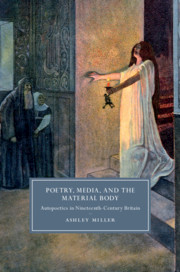Book contents
- Poetry, Media, and the Material Body
- Cambridge Studies in Nineteenth-Century
- Poetry, Media, and the Material Body
- Copyright page
- Contents
- Acknowledgments
- Introduction
- Chapter 1 Striking Passages
- Chapter 2 Internal Impressions
- Chapter 3 Listening with the Mouth
- Chapter 4 Poetic Afterlives
- Conclusion The Autonomous Poem
- Notes
- Bibliography
- Index
- Cambridge Studies in Nineteenth-Century Literature and Culture
Chapter 3 - Listening with the Mouth
Tennyson’s Deaths of Arthur
Published online by Cambridge University Press: 30 July 2018
- Poetry, Media, and the Material Body
- Cambridge Studies in Nineteenth-Century
- Poetry, Media, and the Material Body
- Copyright page
- Contents
- Acknowledgments
- Introduction
- Chapter 1 Striking Passages
- Chapter 2 Internal Impressions
- Chapter 3 Listening with the Mouth
- Chapter 4 Poetic Afterlives
- Conclusion The Autonomous Poem
- Notes
- Bibliography
- Index
- Cambridge Studies in Nineteenth-Century Literature and Culture
Summary
- Type
- Chapter
- Information
- Poetry, Media, and the Material BodyAutopoetics in Nineteenth-Century Britain, pp. 88 - 121Publisher: Cambridge University PressPrint publication year: 2018



